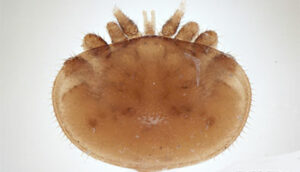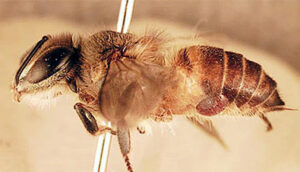Read the latest information on
Foot-and-mouth disease
Beekeepers and growers of pollination-reliant crops are celebrating the official announcement by the Department of Agriculture, Water and the Environment that varroa mite (Varroa jacobsoni) has been eradicated from Townsville in Queensland (QLD).
There are two kinds of varroa mite, Varroa destructor and Varroa jacobsoni, and both are considered high priority pests for Australia’s beekeeping industry and bee-reliant cropping industries.
Asian honey bees and European honey bees are the natural hosts for V. jacobsoni and V. destructor respectively with instances where V. jaconsoni have attached to European honey bees.

Varroa jacobsoni, Image courtesy of Pest and Diseases Image Library, Bugwood.org
Varroa mites attach to honey bees and larvae, feeding on haemolymph (the bee equivalent to blood), affecting the growth and lifespan of honey bees and worsening the effects of honey bee viruses.
Not to be confused with braula fly or pollen mites that are similar in colour, it can be difficult to detect varroa in the early stages of hive infestation. In the Townsville incursion several activities including extensive port surveillance, testing for mites in Asian honey bees nests, and monitoring European honey bee colonies for mites that may have jumped from one type of bee to the other, were needed to demonstrate proof of freedom.
Following proof of freedom, restrictions on the movement of live European honey bees from the Townsville City Council local government area have also ended.
The successful eradication response was a collaboration between government and industry, led by Queensland Department of Agriculture and Fisheries, the honey bee industry and Australia’s pollination reliant industries.
According to the National Plant Biosecurity Status Report, in 2018-19, the Australian honey and beeswax production was valued at $162 million, however the true commercial value of bees lies in their contribution to the pollination of crops, believed to be around $14.2 billion.

Varroa jacobsoni attached to the lower abdomen of an Asian honey bee, Image courtesy of Pest and Diseases Image Library, Bugwood.org
Crops including almonds, apples and pears, lychees, macadamias, mangoes, melons, vegetables, avocadoes, cherries, grains, berries and stone fruit all depend to some extent on pollination by European honey bees – in either wild or managed hives – to optimise yields and quality of produce.
The eradication of V. jacobsoni maintains Australia’s status as one of the few countries in the world that remains free from both species of varroa mite.
All beekeepers in Australia should inspect their hives regularly for signs of varroa mite and other exotic pests. If you suspect your bees may have been affected, phone the Exotic Plant Pest Hotline on 1800 084 881.